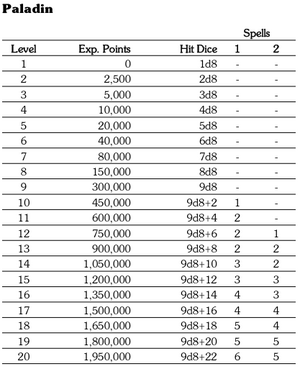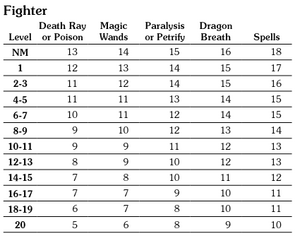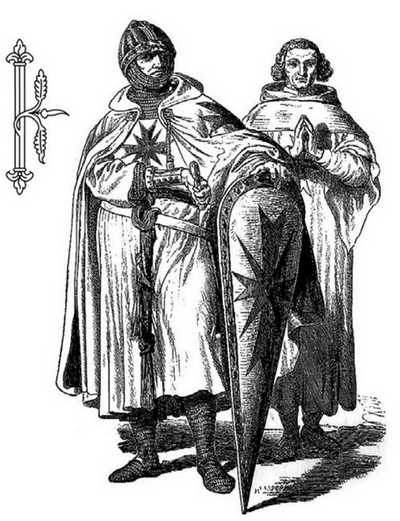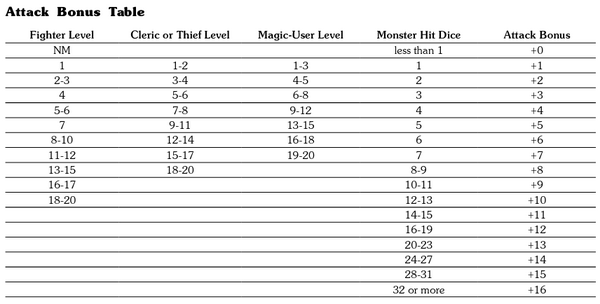Difference between revisions of "Paladin"
From The Pedantic March Wiki
WolandNW3T (talk | contribs) |
WolandNW3T (talk | contribs) |
||
| (8 intermediate revisions by the same user not shown) | |||
| Line 1: | Line 1: | ||
== | == Paladin == | ||
[[File:Paladin01.png|400px|right]] | [[File:Paladin01.png|400px|right]] | ||
| Line 8: | Line 8: | ||
![[File:FighterSavesTable.png| 300px]] | ![[File:FighterSavesTable.png| 300px]] | ||
|} | |} | ||
[[File:AttackBonusTable.png| 600px]] | |||
===Description=== | ===Description=== | ||
A Paladin must obey a code of honor, as defined by the Game Master, and must try to perform duties assigned by his or her deity or religious hierarchy. If the Paladin breaks the code, all powers granted are taken away, and the character must atone for his or her actions as soon as possible. Until the Paladin successfully atones, as defined by the Game Master, he or she is considered an ordinary [[Fighter]]. | |||
===Weapons and Armor=== | ===Weapons and Armor=== | ||
* Any and All | * Any and All | ||
===Features=== | ===Features=== | ||
* 10' Aura of [[Spell:Protection from Evil|Protection from Evil]] (or good, depending on the Paladin's particular faith) | |||
* [[Spell:Detect Evil|Detect Evil]] (or good, as above) at will, as the spell. | |||
*Once per day, per level, a Paladin can make his or her non-magical melee weapon or attack form equivalent to a magic weapon for purposes of hitting creatures only able to be struck with a silver or magical weapon. This effect lasts for a turn. | |||
*Once per day, the paladin can [[Lay on Hands]] to any wounded character and heal 2 points of damage; add the Paladin's Charisma bonus to this figure. On each odd-numbered level (3rd, 5th, etc.) the Paladin may do this one additional time per day (so, twice per day at 3rd level, three times per day at 5th level, etc.) Starting at 7th level, the Paladin may choose to [[Spell:Cure Disease|cure disease]] (as the spell) instead of providing healing as above. At 11th level, the Paladin may also substitute [[Spell:Neutralize Poison|neutralize poison]]. | |||
*A Paladin can [[Turn Undead|Turn (or command) undead]] as a Cleric of a level equal to half his or her own, rounded down, tarting at 2nd level. | |||
*Paladins gain the ability to cast appropriate Clerical spells at level 10. For purposes of spell effects that vary based on the | |||
Cleric's level, use one-half the Paladin's level, rounded down. | |||
===Restrictions=== | |||
* Abilities: [[Strength]] 9, [[Wisdom]] 11, [[Charisma]] 11 | |||
* Tithe: 10% of loot goes to the church | |||
* Strict Code of Conduct | |||
[[Category:Class]] | [[Category:Class]] | ||
Latest revision as of 23:32, 9 May 2022
Paladin
Progression

|

|
|---|
Description
A Paladin must obey a code of honor, as defined by the Game Master, and must try to perform duties assigned by his or her deity or religious hierarchy. If the Paladin breaks the code, all powers granted are taken away, and the character must atone for his or her actions as soon as possible. Until the Paladin successfully atones, as defined by the Game Master, he or she is considered an ordinary Fighter.
Weapons and Armor
- Any and All
Features
- 10' Aura of Protection from Evil (or good, depending on the Paladin's particular faith)
- Detect Evil (or good, as above) at will, as the spell.
- Once per day, per level, a Paladin can make his or her non-magical melee weapon or attack form equivalent to a magic weapon for purposes of hitting creatures only able to be struck with a silver or magical weapon. This effect lasts for a turn.
- Once per day, the paladin can Lay on Hands to any wounded character and heal 2 points of damage; add the Paladin's Charisma bonus to this figure. On each odd-numbered level (3rd, 5th, etc.) the Paladin may do this one additional time per day (so, twice per day at 3rd level, three times per day at 5th level, etc.) Starting at 7th level, the Paladin may choose to cure disease (as the spell) instead of providing healing as above. At 11th level, the Paladin may also substitute neutralize poison.
- A Paladin can Turn (or command) undead as a Cleric of a level equal to half his or her own, rounded down, tarting at 2nd level.
- Paladins gain the ability to cast appropriate Clerical spells at level 10. For purposes of spell effects that vary based on the
Cleric's level, use one-half the Paladin's level, rounded down.

